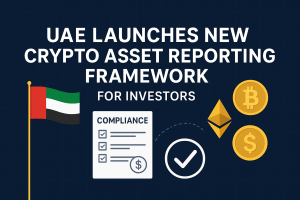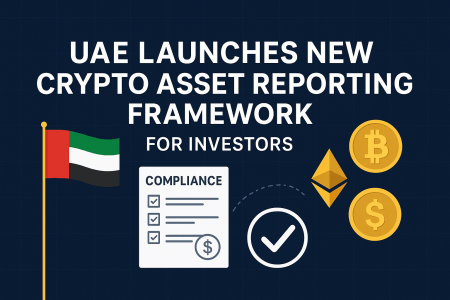Over the last decade, Bitcoin has grown from an experimental digital phenomenon to a popular asset class. This precipitous ascent has presented several obstacles, the most significant of which are taxation and regulatory compliance.
For both investors and businesses, tax preparation is critical to protecting earnings and ensuring long-term success. Dubai stands noteworthy in this context. With a 0% personal income and capital gains tax regime and a forward-thinking regulatory framework, many people wonder if Dubai is a cryptotax haven. You’ll also find people asking you questions like “Is there a crypto tax in Dubai”?
This thorough guide will cover all you need to know about crypto taxes in Dubai.
 Is There a Crypto Tax in Dubai?
Is There a Crypto Tax in Dubai?
Taxation concerning individuals in the UAE is remarkably uncomplicated. There is no tax on personal income and there is no capital gains tax. This means that if you are trading, staking, holding, or even cashing out crypto for your spending, you will not owe a dirham in tax. Whether you are flipping tokens, earning from DeFi platforms, or cashing out long-held tokens, once again, the gains are tax-free – so long as you are acting for personal investment purposes.
The dynamics shift once crypto is injected into a business. If you are using crypto as part of a business, for example running a crypto exchange, trading desk, mining farm, advising on crypto, or creating NFT collections to sell, well, then you are now performing a commercial activity. The UAE’s federal corporate tax regime regulation took effect from June 2023. In this situation, any income or profits made through the crypto would be considered in the same way as income or revenue from any other business and taxed at the corresponding applicable commercial corporate tax rate.
Basically, individuals benefit from full tax exemption on their crypto activities. However, businesses should be fully aware of their corporate tax requirements if they begin to use crypto as part of their operating model.
How is cryptocurrency taxed in Dubai?
For individuals, it’s simple. 0%. Any personal trading, holding or staking of crypto is tax-exempt.
Companies have a more defined tax operational environment. Businesses with a gross annual turnover that exceeds AED 375,000 will need to pay a 9% corporate tax on the net profit earned over this amount.
When businesses engage in crypto, VAT applies: If your business sells goods or services in the UAE – whether you are paid in fiat, crypto or stablecoins – a 5% VAT applies.
Free-zone businesses may have benefits. Some free zones have preferential or deferred corporate tax rates. But each zone specifies and has different rules so check the rules for your circumstances.
Is Dubai a Crypto Tax Haven?
The tax structure is an important issue to consider when analyzing any nation for cryptocurrency activity. Dubai’s tax rules position it as a de facto crypto tax haven for a number of reasons.
Zero Tax on Crypto Gains: Unlike many Western nations, which levy large capital gains and income taxes on cryptocurrency transactions, Dubai provides a tax-free environment for both people and enterprises. This ensures that investors retain 100% of their gains, and firms can reinvest earnings without incurring additional tax penalties.
Simplified Tax Reporting: The lack of sophisticated crypto-specific tax standards eliminates the need for intricate record-keeping and compliance methods. This simplified technique is particularly appealing to regular traders, investors, and cryptocurrency companies.
Regulatory Stability and Support: The Dubai government is actively promoting the development of digital assets and blockchain technology. Dubai is a haven not only for tax purposes, but also for general corporate development and innovation, thanks to its stable regulatory environment, business incentives, and strong legal infrastructure.
Filing Deadlines for Crypto Taxations
Corporate Tax: Companies must file their corporate tax with the relevant authority within 4 months following the end of their accounting year, or penalties may apply for missing the deadline.
- VAT: Companies that are registered for VAT must file returns on either a monthly or quarterly basis, dependent on revenue and FTA classification. They must also ensure all crypto-based sales or service transactions are included in the return.
- Individuals: There is no filing requirement for individuals who are engaging in crypto for personal use. Trading, staking or personally holding crypto remains 100% tax-free and off the tax radar, hence no returns, no forms, and no reporting.
How to Calculate Crypto Taxes in Dubai?
To calculate your crypto taxes in Dubai as a business, start with the total revenue related to crypto including, trading profits, and NFT sales, mining income as well as crypto payments for goods or services. Next, net allowable expenses against the revenue mandatory at the conversion rate at the time, including supporting documents to show things such as hardware depreciation, electricity costs, exchange or gas fees, and other overheads related to your operations. The first AED 375,000 of net profits is tax-free; the next taxable profits are taxed at 9%. If you are registered for VAT purposes, add 5% on the AED value of any taxable supplies, even if paid in crypto. Individuals trading or investing as personal use do not pay tax and do not have to file taxes.
Dubai is fast becoming one of the world’s most ideal jurisdictions to establish a legal footprint for individuals and businesses operating within the digital asset environment. It has no personal income or capital gains tax, simple compliance structures, and a regulatory framework that is looking to the future and providing an environment unrivalled elsewhere for crypto investors who desire legal clarity and tax efficiency.
While the tax consequences for businesses are more complicated once crypto is included as part of a commercial operation, the principal findings are as follows: companies paying corporate profits tax at a rate of 9% on profits above AED 375,000 and 5% VAT on all taxable supplies. This applies to all taxable supplies, regardless of whether the supply is made in crypto.
Irrespective of whether you are an individual investor, a startup creating NFTs, or a licensed virtual assets service provider—understanding the differences between personal and business use is essential. Dubai values transparency, structure, and proper tax planning—not only is Dubai a crypto tax haven, but it is also a global hub for compliant innovation.








